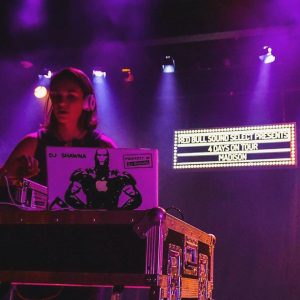COVID-19 impacts Wisconsin musicians, entertainers
May 12, 2020

Shawna Nicols, official disc jockey for the Milwaukee Bucks and professionally known as DJ Shawna, flew back to Milwaukee, Wisconsin, on March 11 after DJing the Pacific-12 women’s basketball tournament.
She was home for only a day and a half, preparing her next set for the upcoming Milwaukee Bucks game at Fiserv Forum. Nicols was about to watch the Utah Jazz play against the Oklahoma City Thunder when a man ran out onto the court and announced the game would be postponed. Two players tested positive for the novel coronavirus.
“In that moment, the entire NBA literally crumbled,” Nicols said. The NBA decided to suspend the remainder of the basketball season and DJ Shawna found out through Twitter that she was out of the job.
Nearly every state in the country began to shut down local businesses. Whether it be hair salons, garden centers, or bars or restaurants, local businesses nationwide were required to prohibit all possible social interaction between their clientele, most having the only option of closing entirely.
Nicols said events being canceled left a gap for entertainers and musicians whose main source of income is dependent on in-person performances.
According to a study by the Future of Music Coalition, the estimated gross income for a working musician in all genres is $35,300.
With live performances reported as a 27% income allocation and with venues being closed, over a quarter of a musician’s revenue is diminished due to the coronavirus pandemic.
“This has opened my eyes,” music producer JC Carter said. “Coming into 2020, I told myself I was going to get on stage more often. Then this happened.”
With independent musicians like Carter and DJ Shawna worried about how they will continue to support their expenses for the coming months, Nicols’ manager, Chad Addie, came up with a way that artists could still perform to an audience and make money.
Addie set up an online streaming company to help give artists a way to generate tips and still perform for their fans. Carter said the tips are a nice gesture, but are not enough to keep his business financially stable.
In a survey by insurance company Prudential, 54% of Americans said they are not financially prepared to manage a contagious disease outbreak that requires quarantines and limits their ability to work for several weeks.
Nicols said that even with the ability to perform online, the audience is not as likely to donate to their favorite independent talent due to their own financial challenges, but monetary contributions are not the only way audiences can help.
“I am more focused on outreach during the quarantine so that I can connect with new fans when people are able to congregate again,” Nicols said.
The DJ said that the work musicians do is going to be even more important after the quarantine is lifted.
“What’s getting people through this is entertainment,” Nicols said. “When we get to be back at Summerfest, Pridefest or Fiserv Forum, it’s going to be that much more special. Entertainers are going to be one of the only reasons people get together again.”













